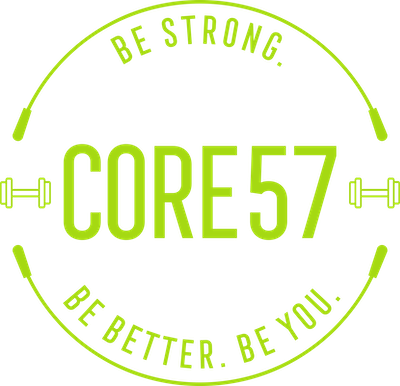Practical Tips for Managing Inflammation
Inflammation is definitely having her moment as a hot buzzword in the wellness space! Rightfully so, as we are learning more and more about the connection between chronic inflammation and cancer, heart disease, diabetes, and other lifestyle-related ailments.
However, with increased awareness, companies are flooding the market with products that, more often than not, are a waste of money! As CORE57's in-house nutrition coach, my goal is to educate you on all things inflammation and ways to prevent excess or chronic issues without breaking the bank or losing your sanity. The fact of the matter is, LIFESTYLE IS KING!
The Good and Bad of Inflammation
First off, inflammation is not all bad. Healthy inflammation happens after you work out as part of the recovery process when you get an acute injury and swell, and when your body is fighting off an infection. What we want to avoid is when inflammation becomes chronic.
The BIGGEST culprits of chronic inflammation are very much within our control but are quite the opposite of how most Americans live and the way our society has evolved. We spend more time sitting than moving, we don’t sleep enough, and we eat more packaged convenience food than fresh produce and lean proteins. As a result, most Americans take in more calories than they expend and carry excess body fat, significantly contributing to chronic inflammation.
Major Contributors to Inflammation
The biggest contributors to excess calorie consumption include:
Highly processed, packaged, ultra-palatable food
Sugar-sweetened beverages
Alcohol
These things cause high spikes in blood sugar and subsequent crashes, which are inflammatory when occurring frequently. This is different from the normal, expected rises in blood sugar that occur when we eat mixed, balanced meals.
Dr. Michael Twyman, a world-renowned board-certified cardiologist, explains that chronic high levels of insulin damage the endothelium (the layer of cells on the inside of your heart arteries), causing plaque to stick, similar to Velcro. If the endothelium stayed smooth (with no damage caused by chronic high insulin), then the circulating fat droplets would not stick, therefore, no plaque buildup! This is why we now realize that it’s very important to monitor how your body handles glucose by checking your Hemoglobin A1C, fasting insulin, and C-reactive protein in addition to lipid panels checking cholesterol when we are looking for heart disease risk!
Learn more on the Dr. Dhru Purohit Show podcast.
Tips to Reduce Inflammation
So, what can we do to help tip the scales downward when it comes to inflammation? First, increasing the consumption of vegetables and fruits that are high in antioxidant compounds is hugely impactful for two reasons:
Antioxidants fight free radicals that contribute to inflammation, which is connected to a number of diseases, such as heart disease and cancer.
Eating more produce, which is high in water, fiber, and micronutrients, FILLS YOU UP with very few calories. Eating more of this stuff promotes balanced blood sugar and likely will leave less room for the other stuff that we should be eating less of.
Here are the top 7 anti-inflammatory foods you should incorporate into your nutrition plan:
Berries: High in anthocyanins, antioxidants that decrease oxidative stress and inflammation. They also pack 5-8 grams of fiber per cup! Try blackberries, raspberries, strawberries, and blueberries.
Fatty Fish: Wild-caught salmon, mackerel, sardines, and anchovies are high in omega-3 fatty acids, which help lower bad cholesterol, increase good cholesterol, and decrease inflammation.
Broccoli: Rich in sulforaphane, a compound known to decrease inflammation.
Avocado: Packed with monounsaturated fat, potassium, magnesium, fiber, carotenoids, and tocopherols, reducing cancer and diabetes risk.
Bell Peppers: High in vitamin C and the antioxidant quercetin, which decreases diabetes risk.
Cherries: Rich in catechins, another powerful antioxidant.
Tomatoes: Loaded with the antioxidant lycopene, vitamin C, and potassium.
My challenge to you is to add at least 1-2 items from the above list each day. Bonus points if you replace a packaged food with one of these! Fruits are super easy to grab and go—just wash them and put them in a Ziploc bag to carry in the car on errands. Same thing with veggies—slice up some bell peppers and grab a container of grape tomatoes to take with you!
Supplements for Combating Inflammation
Consider these supplements to combat inflammation:
Fish Oil: High potency, third-party tested options like Nordic Naturals are great. Aim for 1,000 mg each of both EPA and DHA per day.
Vitamin D: Vitamin D deficiency is linked to increased inflammation and other ailments. If you are deficient, aim for 5,000 IUs per day, preferably in combination with Vitamin K2 for better absorption. Designs for Health, Nutridyne, and Thorne are excellent third-party tested brands.
Curcumin: Found in turmeric, this potent antioxidant can be supplemented with options like Thorne's Curcumin Phytosome.
Key Takeaways to Reduce Inflammation
Several lifestyle factors contribute to inflammation that are 100% in our control. Focus on:
Limiting big blood sugar spikes by eating mixed meals with a good amount of protein and fiber.
Maintaining energy balance by not overconsuming calories, thus avoiding excess body fat (which is inflammatory in and of itself.)
Increasing the consumption of fruits and veggies, especially those high in antioxidants.
Decreasing the intake of highly palatable, processed/packaged foods.
Walking 5-10 minutes after meals to improve blood sugar balance and lower Hemoglobin A1C (the diabetes marker.)
Get Inflammation Under Control with CORE57
Ready to take control of your inflammation and overall health? Join CORE57’s nutrition coaching program today to find out which foods are inflammatory for you and how to tailor your diet for optimal wellness. We will show you how to make these changes sustainable, so you never have to “diet” again! Get started on your path to wellness today — your body will thank you!

